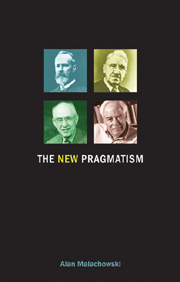Book contents
- Frontmatter
- Contents
- Preface
- Acknowledgements
- Abbreviations
- 1 Introducing the New Pragmatism
- 2 Leaving classic pragmatism behind
- 3 Rorty against the tradition
- 4 Putnam's contributions
- 5 Putnam and Rorty: pragmatism without reconciliation
- 6 Prospects
- Conclusion: the New Pragmatism and philosophy
- Notes
- Reading the New Pragmatists
- Bibliography
- Index
3 - Rorty against the tradition
- Frontmatter
- Contents
- Preface
- Acknowledgements
- Abbreviations
- 1 Introducing the New Pragmatism
- 2 Leaving classic pragmatism behind
- 3 Rorty against the tradition
- 4 Putnam's contributions
- 5 Putnam and Rorty: pragmatism without reconciliation
- 6 Prospects
- Conclusion: the New Pragmatism and philosophy
- Notes
- Reading the New Pragmatists
- Bibliography
- Index
Summary
Reading Rorty is not like reading any other philosopher.
(Christopher Voparil, Richard Rorty)Richard Rorty had such an important influence on the New Pragmatism, and in such a variety of ways, that it is worth examining his approach in the round. And, this can best be done by looking at how his pragmatism, the New Pragmatism, evolved out of a long and complex philosophical journey, one that is often misinterpreted with unfortunate consequences for the reception of his views. Moreover, certain aspects of that journey help to explain why Christopher Voparil is exactly right in saying that reading Rorty is a unique experience.
We treat Rorty somewhat differently from Putnam (see Chapter 4) in that we say far less, in any explicit sense, about his relationship to the New Pragmatism, and even, for the most part, pragmatism in general. Thus, for instance, we include no separate section on “Rorty and the New Pragmatism”. There are good reasons for this. Rorty's pragmatism is better understood against the background of the material presented here, so it is better, especially for readers of an introductory text such as this one, to get that background out of the way first. When we come to consider the practical upshot of Rorty's widespread influence, in Chapter 6, then his relationship to the New Pragmatism should snap into focus, and the background element presented here should help readers make better sense of his interventions in disciplines outside philosophy itself.
- Type
- Chapter
- Information
- The New Pragmatism , pp. 33 - 60Publisher: Acumen PublishingPrint publication year: 2009



